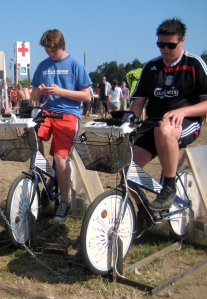You are currently browsing the tag archive for the ‘energy’ tag.
An alternative to saving CO2 by washing at 30 °C is to take your bike instead of using your car. At Roskilde, one of the many initiatives was bicycles placed at the Climate Community, where you could bike and recharge your mobile phone at the same time.

We bumped into Hans and August who were cycling for their life to recharge their mobile phones :). They both thought it was cool to be able to recharge phones themselves, as it felt like a bit of a luxury to be able to ‘bike their way to energy’ as they didn’t have to queue up in the hot weather and stand there and wait to hand their phones to someone else, and then having to go back and pick them up later.
August said he had always been a little aware of making the small changes in order to be environmentally friendly such as turning off the light when leaving the room, biking to work etc., but he said that whenever he took his car to work/gym, he felt really bad about it, because compared to biking there, it produced a lot of unnecessary emissions, and that both he and Hans tried to limit the use of their cars.
August and Hans thought the environment issue was a good theme for the Roskilde Festival, as it brought attention to environmental issues, and made them think more about it, more so in relation to COP15 in December, where Copenhagen is hosting the Climate Conference.

Another original initiative at the Climate Community was the CO2 limbo. The limbo was powered by solar energy and played the limbo song nonstop. The initiative is a really funny approach to the climate changes as the message was: How low can you go? Check out the video:
Is the current focus on the climate just a ghost left over from Bjørn Lomborg’s (a Danish professor and author, opposed to the Kyoto Protocol, who made headlines with his seriously skeptic views on all things environmentally friendly) days, a doomsday-obsessed media stunt, or a subject that really ought to be taken seriously?
The heat of the debate varies widely at this year’s Roskilde Festival, so we took the opportunity to find out how the festival’s visitors feel; does the subject make them steaming mad, or do they give it the cold shoulder?
Pernille sits weary and alone back at her camp, keeping watch over things. She considers herself as ‘climate conscious’, but is quick to point out that she’s not fanatical. Her interest in the climate grew after hearing Bjørn Lomborg’s opinions on global warming. She decided to take things in to her own hands, and began to research what was hot and what was not, in the never-ending climate debate.
“I probably should do more, or join an organisation or something,” she says, adding immediately that she does watch her energy and water consumption every day; something which is important to her. “It’s really now that we should be attentive to what’s going on, because pretty soon we’re going to see some serious consequences.”
In another camp, pink tulle hangs from the tents in ‘the notorious tulle-camp’, and in the shade under the garden pavilion, all this climate talk is being, well, talked about.
“It’s all hype,” is the general consensus. “Everything that’s going on now is all part of nature. The average temperature, and water level have both been higher in the past than it is now.” In their view, it’s not something that really deserves a great deal of thought. They might, if reading an article concerning the environment, give the matter a seconds thought, but it’s quickly forgotten, as it now just blends in with all the other ‘climate talk’, not to mention the guilt inducing finger pointing.
“I don’t think that it effects us on a day-to-day basis,” the tulle-camp claim. “Of course you can buy environmentally friendly products, but if they’re more expensive, then I don’t want to. Just like I don’t turn the tap off when I brush my teeth.”
Ida and Jakob are dedicated festival-goers despite their young age. Even though Ida has been affected by the views of her parents, it was six years ago that she first really became aware about the climate, a subject that in her opinion should be prioritised by politicians who make far too many hollow promises.
At Jakob’s house, the subject has never really been something that was talked about, but now he makes conscious choices every day, particularly concerning energy. As far as he’s concerned, just one person can make a difference simply by buying local produce, environmentally friendly products, and by avoiding mass-produced products.
“The climate problem can become a much greater problem than it is now,” says Jakob, “which is precisely why it’s so important to nurture a culture which is really climate aware.”


